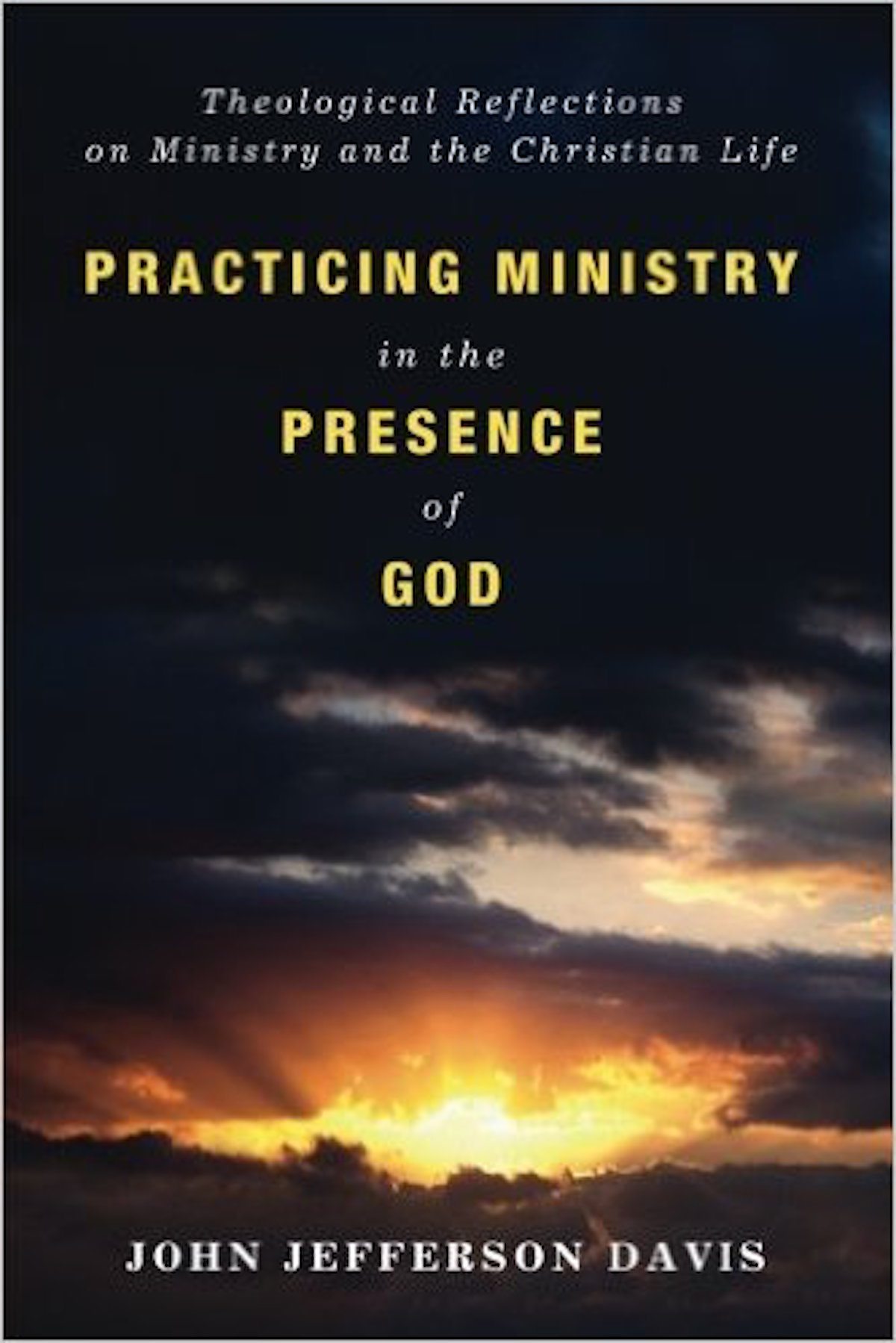Let me begin with a confession: I typically find books of collected essays frustrating.
They can be like a greatest hits album from a one-hit wonder, or that Costco sample that sends you racing down the aisle for a full container only to find the sample was all they had. They contain either numerous articles that say little or numerous articles that leave you wanting more.
Practicing Ministry in the Presence of God: Theological Reflections on Ministry and the Christian Life is a collection of 15 essays by John Jefferson Davis, longtime professor of systematic theology and Christian ethics at Gordon-Conwell Theological Seminary. Thankfully, this book delivers on much of what it promises.
The theme of divine encounter forms the ballast of a trilogy, of which this is the final volume. Davis first focused on God’s presence with his people in worship (Worship and the Reality of God: An Evangelical Theology of Real Presence, 2012), then its place in devotional Scripture reading (Meditation and Communion with God: Contemplating Scripture in an Age of Distraction, 2012 [review]). In this final installment, he focuses on the place of divine presence in ministry and the Christian life.
From Libraries to Pews
Davis writes Practicing Ministry in the Presence of God to demonstrate how the divine encounter informs the “ministry of the church, evangelism, discipleship, salvation, and ordination, Scripture memorization, prayer, church unity, and the nature of the life to come” (vii). The heartbeat of this book is to clarify that:
All Christian ministry—and all of the Christian life—is not exercised independently, but in the presence of God and in partnership with God, based on the promise of Christ to be with his people (Matt. 28:20) and the reality of our abiding union with Christ (John 15:5). Authentic biblical ministry is not done in merely human energy, but in union with Christ and in partnership with . . . the body of Christ. (vii)

Practicing Ministry in the Presence of God: Theological Reflections on Ministry and the Christian Life
John Jefferson Davis
Practicing Ministry in the Presence of God: Theological Reflections on Ministry and the Christian Life
John Jefferson Davis
The essays that follow challenge us to move our biblical theology from our libraries and studies into our pulpits, planning committees, and church parking lots.
But even with this overarching purpose in place, Practicing Ministry in the Presence of God feels scattered at times. Some essays are stronger than others, while some are controversial (e.g., his take on women’s ordination is sure to step on toes). But what’s more, the essays themselves don’t always fit the stated premise. The wide range of topics covered sometimes feels too wide. It was initially surprising, in a book about ministry in God’s presence, to find essays on John Calvin, N. T. Wright, everlasting punishment, and the role of work in the new creation.
With a closer look, though, Davis appears to use this tension to his advantage. His breadth of material shows us these topics—scattered as they may feel—are connected through theology. And, as Davis argues, theology and ministry should be integrated.
Purposed in Presence and Partnership
Even with each chapter playing its part, some carry more significance. These essays have enough “gravitational pull” to keep the others in orbit. Composing the book’s epicenter is the essay “Practicing Ministry in the Presence of God and in Partnership with God.” Here, Davis’s collection finds its principal thesis. He is again trying to push theology back into the local church. The basis for ministry, he contends, isn’t the minister or the congregation’s service or actions (i.e., function), but the one in whom we find our being and belong (i.e., ontology).
In a sense, this feels like Davis’s attempt to put the “humpty dumpty” of Christian ministry back together again with the “glue” of trinitarian theology. Ministry, he argues, should be built first and foremost on the triune God, the one who draws near to direct and partner with the pastor/congregant through union with Christ and the presence of the Spirit. This is the true identity and purpose for both pastor and church. And this is why ministry ends where it begins—namely, in an ever-growing experience of communing with God and his people.
Ministerial Implications and Results
Davis’s dense theological commitments also have dense ministerial implications. His trinitarian lens yields a kaleidoscopic spectrum of biblical and theological colors that dance their way onto our all-too-often monochromatic churches. This model does the opposite of what so many other ministry models advocate today. Davis encourages us to pursue
a slower, more contemplative approach to ministry, one that recognizes that before the outward act, the pastor should be grounded internally, prayerfully, and contemplatively, in the experience of the love of God known through union with Christ, and then empowered to execute that ministry outwardly in partnership with other gifted members of the body of Christ. (68)
Biblical theology, with its emphasis on the real presence of God, transforms the minister internally so that actual external ministry can happen.
This central essay’s power is found in its results. When you finish it, you want the type of ministry Davis describes. In a closing section, he brings his theory to life by framing its applications. He takes on the Great Commission, propels his arguments through examples from Calvin and Spurgeon, uses the book of Acts to build bridges between God’s presence and the divine-human partnership for the church, and summarizes the practical benefits of doing ministry in the presence of God. And yet even as these points flesh out his ideas, I would assume most readers, like me, would want more—perhaps a book-length treatment of this argument.
Voice in the Wilderness
Also grounding the center of Practicing Ministry in the Presence of God is the essay “American Evangelicalism 3.0.” Here Davis exhibits another of his strengths: being theologically constructive. In other words, he doesn’t just tear down (though he’s a vigorous critic); he also wants to build up. So much so that at times this essay reads like a long-lost chapter in David Wells’s four-volume critique of contemporary evangelicalism. It’s as if Davis—who recognizes this himself in a footnote—is writing his own prescription to his colleague’s evangelical diagnosis. [Editors’ note: see Wells’s No Place for Truth: Or Whatever Happened to Evangelical Theology? (1993); God in the Wasteland: The Reality of Truth in a World of Fading Dreams (1994); Losing Our Virtue: Why the Church Must Recover Its Moral Vision (1998); and Above All Earthly Pow’rs: Christ in a Postmodern World (2005).]
What results is a new brand of evangelicalism. Davis weaves the same systematic emphases on the Trinity, union with Christ, and realized eschatology into the foundational principles of what he terms a “new paradigm” for evangelicalism.
One problem is that many evangelicals are wary of a full paradigm shift. Often everything is about speed, quantifiable results, and cultural reaction and engagement. Davis’s proposal isn’t really any of these things. He’s technical, protracted, and surgical in his message. Few of his sentences will find their way onto social media or Christian T-shirts. But his message matters.
Theological depth is what we need, and this is why evangelicals should engage Davis’s paradigm. His voice in the wilderness has much to say, even if it’s not what we’re used to hearing.
Good Place to Start
Even with these strengths, I’m not sure who will read this book. Given the different original contexts to which each essay is written, it’s difficult to nail down a target audience. Moreover, I’m not sure evangelicalism wants to be confronted by Davis’s critique and proposal.
On the whole, Davis has done us a great service. He’s held up a mirror to the idolatry of our own ministries and called us back to a trinitarian model marked by the presence of God. Unfortunately, we really don’t like giving up our idols—especially when they’re our own egos. We’d often rather kneel beside Narcissus than stare at the cold, hard critique Davis provides. But this is more of an indictment of us than of him.
For those broken enough, searching for a better way, much of Practicing Ministry in the Presence of God is a great starting point.




































